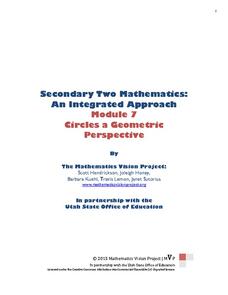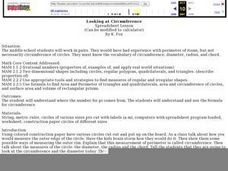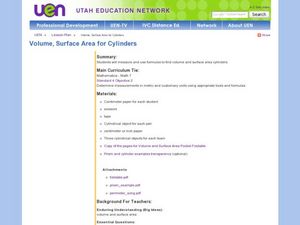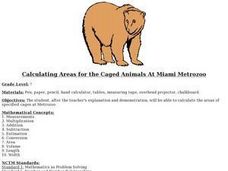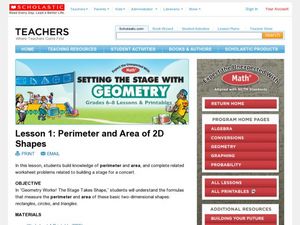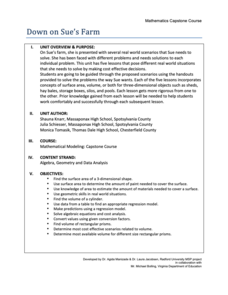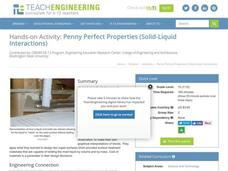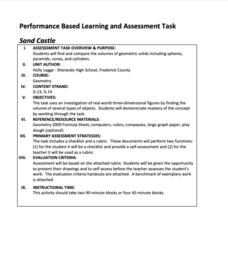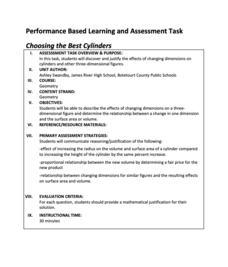Teach Engineering
Determining Densities
Don't be dense—use a robust resource. The second installment of a five-part Floaters and Sinkers unit has learners determine the densities of several objects. As part of the activity, they learn the displacement method for finding...
EngageNY
End-of-Module Assessment Task: Grade 8 Mathematics (Module 7)
It's time to discover what your classes have learned! The final lesson in the 25-part module is an assessment that covers the Pythagorean Theorem. Application of the theorem includes distance between points, the volume of...
Mathematics Assessment Project
Bestsize Cans
Traditional calculus problem made simple. In the high school assessment task, learners determine the minimum surface area for a can of a given volume using algebraic and numerical methods to solve the problem. No calculus...
Teach Engineering
Density Column Lab - Part 2
Groups suspend objects within layers of liquids to determine the densities of different liquids and compare them to the densities of objects calculated in Part 1. The groups then carefully test their calculations by layering the...
Mathematics Vision Project
Module 5: Circles A Geometric Perspective
Circles, circles, everywhere! Pupils learn all about circles, central angles, inscribed angles, circle theorems, arc length, area of sectors, and radian measure using a set of 12 lessons. They then discover volume formulas through...
Teach Engineering
Floaters and Sinkers
Whatever floats your boat. Young engineers learn about density by measuring the masses and volumes of boxes filled with different materials. Using their knowledge of densities, they hypothesize whether objects with given densities will...
Rice University
Calculus Volume 2
Delve into the middle of calculus. The resource is the second eBook of three that covers the complete calculus content. Seven chapters begin with integrals and different methods of integration before moving on to differential equations....
Teach Engineering
Scale Model Project
Try your hand at scale models. Scholars create a scale model of an object using a scale factor of their choice. As part of the project, they give presentations on their processes and calculations. This is the last installment of the...
Mathematics Assessment Project
Propane Tanks
As an assessment task, learners must determine the radius of a new tank that has double the capacity of a given tank. Task tests knowledge of determining volumes of cylinders and spheres.
Mathematics Vision Project
Circles: A Geometric Perspective
Circles are the foundation of many geometric concepts and extensions - a point that is thoroughly driven home in this extensive unit. Fundamental properties of circles are investigated (including sector area, angle measure, and...
Curated OER
Looking at Circumference
Young scholars understand where the number for pi comes from. They understand and use the formula for circumference. Students measure the circles given out and the diameters of those circles and record the results on their worksheet.
Curated OER
Surface Area
In this geometry instructional activity, 10th graders define surface area, net and lateral face. They calculate the surface areas of cones, prisms and cubes. There are 9 surface area questions.
Curated OER
Volume, Surface Area for Cylinders
Seventh graders explore the concept of volume and surface area of cylinders. In this volume and surface area of cylinders lesson, 7th graders break cylinders into their base shapes of a circle and a rectangle. Students discover that...
Curated OER
Calculating Areas for the Caged Animals At Miami Metrozoo
Seventh graders calculate the area of certain cages at the Miami Metrozoo after observing a teacher demonstration.
Curated OER
Area Lesson Plan
Students manipulate a variety of materials and computer applets in order to explore area and the units used to measure it.
Curated OER
Perimeter and Area of 2D Shapes
Young scholars find the perimeter and area of circles, triangles, and rectangles. In this perimeter and area activity, the teacher gives students formulas for each shape and measurement and works through examples on the board. While no...
Curated OER
Area, Perimeter, and Volume
In these area, perimeter, and volume worksheets, students complete 6 different activities to determine area, perimeter, or volume of a figure.
Radford University
Down on Sue's Farm
When would a farmer use math? Class members work through five tasks on a farm that require knowledge of surface area, volume, and determining regression equations. The challenges range from figuring out the amount of paint to buy,...
Teach Engineering
Penny Perfect Properties (Solid-Liquid Interations)
I can get more water to stay on a penny than you can! Collaborative pairs determine the volume of liquids that can be contained on the surface of copper pennies and plastic coins. The pairs analyze their results using graphs and go on to...
Space Awareness
Oceans on the Rise
Temperature rises and land disappears! Through a lab exploration, learners understand the effect of temperature increase on water similar to the effect of global warming on our oceans. As they heat the water in a flask, they measure the...
College Board
2006 AP® Calculus AB Free-Response Questions Form B
An exam divides the six free-response questions into calculator use and no calculator use items. The non-calculator items are conceptual in nature and test whether pupils understand the calculus concepts. Scholars explain their answers...
College Board
2007 AP® Calculus AB Free-Response Questions Form B
What do the questions look like? Six free-response questions provide pupils with knowledge of how calculus topics appear on the AP® Calculus exam. The questions involve calculator and non-calculator problems by providing mathematical and...
Radford University
Sand Castle
Don't let the task slip through your fingers like sand. Scholars design sand castles using hemispheres, pyramids, cones, and cylinders of different sizes. They calculate the volume and surface area and consider how changing the...
Radford University
Choosing the Best Cylinders
Don't be fooled: the taller glass doesn't always hold the most. Given the dimensions of different cylindrical containers for beverages and popcorn, pupils calculate the volumes. They see how changing the dimensions affects the volume and...









